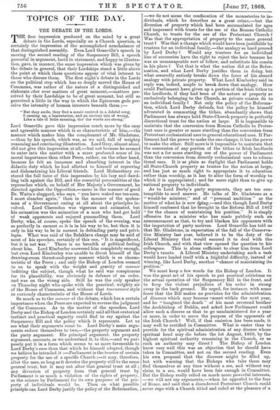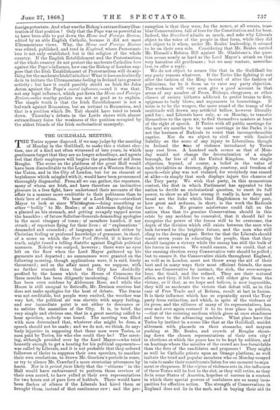TOPICS OF THE DAY.
THE DEBATE IN THE LORDS.
"But they smile, they find a music centred in a doleful song, Seaming up, a lamentation, and an ancient tale of wrong, Like a tale of little meaning, tho' the words are strong."
Lord Granville gave this impression much more by the easy and agreeable manner which is so characteristic of him,—the manner which makes him the complement of Mr. Gladstone, —than by his speech, which was, as we said, full of weighty reasoning and convincing illustration. Lord Grey, almost alone, did not give this impression at all,—but not because he seemed to enter into the matter with a more profound sense of its moral importance than other Peers, rather, on the other hand, because he felt an immense and absorbing interest in the didactic duty which he had allotted to himself of reproving and disheartening his Liberal friends. Lord Malmesbury re- stored the full force of this impression by his lazy and dawd- ling talk against the Bill, and the resentful personalities of the reproaches which, on behalf of Her Majesty's Government, he directed against the Opposition,—more in the manner of good Dr. Watts's sluggard, who says, " you have waked me too soon, I must slumber again," than• in the manner of the spokes- man of a Government caring at all about the principles in- volved. Lord Clarendon was vigorous and animated, but his animation was the animation of a man who had got hold of weak opponents and enjoyed pummeling them. Lord Derby, who, of course, spoke the speech of the evening, was as perfectly in earnest as it is in his way to be, but then it is only in his way to be in earnest in defending party and privi- leges. What was said of the Balaklava charge may be said of most of his speeches, certainly of this one, "It is magnificent, but it is not war." There is no breadth of political feeling about him. Lord Kimberley answered him completely enough, but even Lord Kimberley was unable to divest himself of the drawing-room thrust-and-parry manner which is so charac- teristic of the Peers ; and only the Bishop of London seemed to us to speak with the weight and gravity of manner befitting the subject, though what he said was conspicuous for its plausibility, was obviously in defence of an order, and was on the wrong side. Still he was the only speaker on Thursday night who spoke with the practical, weighty air of the House of Commons, and without that tournament style so curiously characteristic of the House of Lords. So much as to the manner of the debate, which has a certain importance when the Peers are expected to reverse the judgment of the Commons. As to the matter of the speeches, Lord Derby and the Bishop of London certainly said all that oratorical instinct and practical sagacity could find to say against the Suspensory Bill and the policy which it represents. Let us see what their arguments come to. Lord Derby's main argu- ments reduce themselves to two,—the property argument and the party argument. His principal argument, the property argument, amounts, as we understand it, to this,—and we pur- posely put it in a form which seems to us more favourable to Lord Derby's case than that which he himself adopted, though we believe he intended it :—Parliament is the trustee of certain property for the use of a specific Church ;—it may, therefore, alter the uses, so long as it devotes the property still to the same general trust, but it may not alter that general trust at all ; any diversion of property from that general trust by Parliament is as much a violation of the rights of property, as the seizure by Parliament for its own purposes of the pro- perty of individuals would be. Then on what possible principle can Lord Derby justify the policy of the Reformation,
—we do not mean the confiscation of the monasteries to in- dividuals, which he describes as a great crime,—but the diversion of property which had been accumulated for ages and impressed with trusts for the use of the Roman Catholic Church, to trusts for the use of the Protestant Church ? Was that the appropriation of property to the same general trust Was that a change which would have been justifiable by trustees for an individual family,—the analogy so hard pressed by Lord Derby ? Would any trustees for an individual line of succession have the right to reject the heir because he was an unmanageable sort of fellow, and substitute his cousin• in his place ? Yet that is what the nation did at the Refor- mation, and what Lord Derby justifies them in doing, but what assuredly entirely breaks down the force of his absurd analogy with private property. What Lord Kimberley said in reply was, indeed, ample to break down that analogy. How could Parliament have given up a portion of the Irish tithes to- the landlords, if they had been of the nature of property as• exclusively belonging to the Church, as private estates do to an individual family ? Not only the policy of the Reforma- tion, which Lord Derby defends, but the policy he himself advocated in commuting the tithes, abundantly shows that. Parliament has always held State-Church property in perfectly discretional trust for the nation at large. It is impossible to maintain that the conversion from Roman Catholic to Protes- tant uses is greater or more startling than the conversion from Protestant ecclesiastical uses to general educational uses. If Par- liament had the power to make the one change, it has the power to make the other. Still more is it impossible to maintain that the concession of any portion of the tithes to Irish landlords was not a far more startling use of the power of Parliament than the conversion from directly ecclesiastical uses to educa- tional uses. It is as plain as daylight that Parliament holds all State-Church property as trustee for the nation at large, and has just as much right to appropriate it to education rather than worship, as it has to alter the form of worship to• which it is appropriated ; and far more right than to give up national property to individuals.
As to Lord Derby's party arguments, they are too con- temptible to need answer. He talks of Mr. Gladstone as a " would-be minister," and of "personal ambition " as the motive of what he is now ding,—and this though Lord Derby himself confessed that he brought in the Reform Bill of 1867 " for the chance of maintaining his position." It is simply offensive for a minister who has made publicly such an announcement as that, to try and blacken his opponents with the imputation of party motives. Lord Granville has told us that Mr. Gladstone, in expectation of the fall of the Conserva- tive Ministry last year, believed it to be the duty of the Liberal Ministry that would succeed it to deal with the Irish Church, and with that view opened the question to his colleagues. This is alone sufficient to clear him from Lord Derby's taunts. A Liberal Ministry undertaking such a task would have loaded itself with a frightful difficulty, instead of winning, like Lord Derby, another "chance of maintaining its position."
We must keep a few words for the Bishop of London. It was the great art of his speech to put practical criticisms on the actual operation of the Suspensory Bill in the front, and to keep the violent prejudices of his order in strong array in the back ground. He urged, for instance, with some force that the Bill makes no provision for the administration of dioceses which may become vacant within the next year, and he " imagined the death " of his most reverend brother the Archbishop of Dublin, and asked how Parliament could allow such a diocese as that to go unadministered for a year or more, in order to serve the purpose of the opponents of the Irish Church ? Well, if that omission has been made, it may well be rectified in Committee. What is easier than to provide for the spiritual administration of any diocese whose spiritual head may die before the 1st August, 1869, by the highest spiritual authority remaining in the Church, or as such an authority may direct ? The Bishop of London knew very well this was an objection that he should have taken in Committee, and not on the second reading. Even his own proposal that the dioceses might be filled up,
but with warning that the Bishops who take them may find themselves at any time .without a see, and without any
claim to a see, would have been fair enough in Committee.
But the Bishop really relied on much more powerful interests, —we will not say arguments,—when he appealed to the fear of Rome, and said that a disendowed Protestant Church could never cope with a Church titled and ruled at the pleasure of a
foreign potentate. And what was the Bishop's extraordinaryillus- tration of that position ? Only that the Pope was so powerful as to have been able to put down the Home and Foreign Review, edited by an able English Catholic, because it did not meet Eltramontane views. Why, the Home and Foreign Review was edited, published, and read in England, where Protestant- ism is not only established, but is the religion of the whole country. If the English Establishment and the Protestantism of the whole country do not protect the moderate Catholics here .against the Pope's influence, how can the Bishop of London sup- pose that the Irish Establishment of Protestantism will do any- thing for the moderate Irish Catholics? What it does undoubtedly do is to irritate the Ultramontane feeling in Ireland into greater activity ; but how it could possibly shield an Irish Sir John Acton against the Pope's moral influence,—and it was that, not any legal influence, which put down the Home and Foreign Review,—the worthy prelate was not so good as to explain. The simple truth is that the Irish Establishment is not a bulwark against Romanism, but an irritant to Romanism, and that is a position which Dr. Tait should have tried to break down. Thursday's debate. in the Lords shows with almost extraordinary force the weakness of the position occupied by the ablest friends of the Irish ecclesiastical monopoly.































 Previous page
Previous page